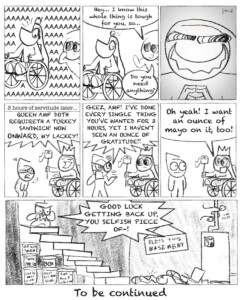Despite there being some downsides to living off campus, students who do seem largely satisfied with their housing.
The cost of living seems to be of little issue to those living in the surrounding area.
Bethany Lennox is a graduate student who lives in Goler House, which is across from the Medical Center. She found that she only paid around $600 per month for rent,electricity, water, parking, and mail, a figure she found “not that bad, especially considering the location.”
Many students considered it a good idea to share the cost of living with roommates, which makes it much more affordable to have your own space. This can include electricity, water, groceries, and more, depending on who is sharing the space.
When considering living off campus, many students wonder how transportation would work. Many people said they walk or bike to work and school.
Brenn Whiting is a senior who lives near the corner of South Ave and Elmwood.She thinks it’s necessary to account for travel time in her schedule, but usually enjoys walking and biking to school. She does not, however, enjoy the commute during the winter, claiming the sidewalks are not always plowed in her area.
While some find the idea of trudging through a long walk in the snow to be off-putting, others like the commute.
Senior Matthew Trombley lives across the street from Riverview, on South Plymouth Ave, and said he loved how the walk in the winter cold was able to wake him up in the morning. He warns, though, that students “just have to be prepared and [be] aware for whatever weather could happen that day.”
The commute also affects how much time someone spends on campus. Contrary to what some may think, an increased distance seemed to have little effect on students’ extracurriculars. Joseph Linden, a senior who has been living off campus for two years now, found that he’s more likely to stay on campus when the snow is too heavy in order to avoid multiple trips in the snow.
Trombley is also active on campus, and thought the distance had no effect on his involvement.
Lennox admitted to not being able to attend certain events due to bus scheduling and available parking, but she still spends a majority of her time on campus. She found living by herself made her more actively seek out her friends in order to spend time with them. It seemed that for some, distance was actually a small motivation to spend more time on activities and social events.
It was also clear that students thought it important to not only stay active in school affairs, but to be involved within the neighborhood as well.
Lennox thought it was vital to know what events are going on in the surrounding area. One benefit of living further away, she said, was that “a lot of mini festivals or store openings or community events might be happening right down the street, and you wouldn’t know a thing about them if you lived on campus.”
Trombley shared a very similar point of view. He advises others living off campus to “become part of the community you are living in.”
“I don’t just mean the UR community, but the Rochester City community,” he continued. “Rochester is a great and diverse city with a lot happening and going for it, so enjoy it while you are here.”

